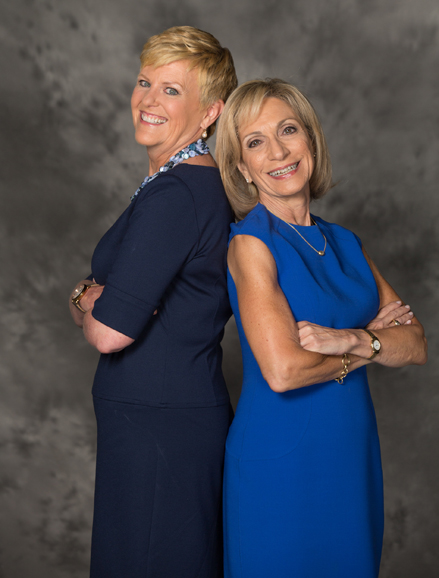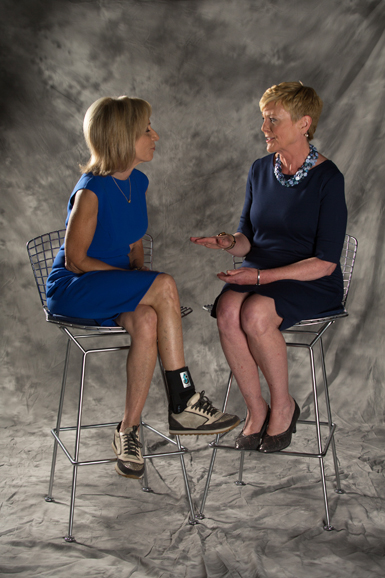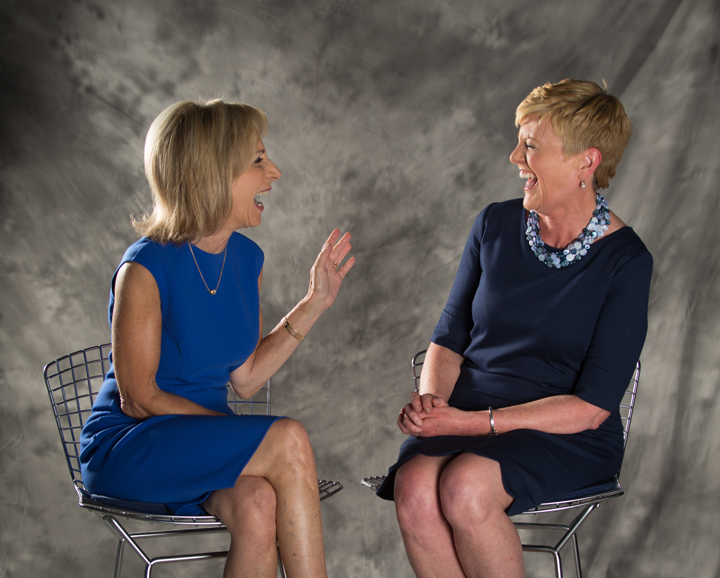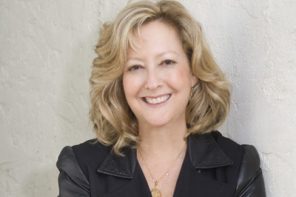NBC colleagues face challenges.
Work saved them.
NBC correspondents Anne Thompson and Andrea Mitchell have been coping for years with breast cancer. Yet despite the debilitating disease, they have maintained grueling schedules and performed at the top of their profession.
By work, they don’t just mean employment. They are talking about life — how to engage the world on and off the job and how to put one foot in front of the other and press on.
Theirs is a story of a commitment to craft that has informed their struggles, a devotion to friends and family that strengthens everyone and a deep friendship that has sustained them through adversity.
“Work saved me,” Thompson says in a recent interview.
“It’s that sense of confronting your own mortality that makes everything more precious,” Mitchell says in the same interview.
Thompson was diagnosed with stage 3 breast cancer in 2006, and she was diagnosed with cancer again last year.
“30 Rock,” NBC headquarters, “became my cancer-free zone,” she says. “It made me freer to work.”
Last year she scheduled treatments and surgery around two major assignments — her coverage of Pope Francis’ visit to the United States and the United Nations Climate Change Conference in Paris.
“Honestly, if I didn’t have that to look forward to, I would have lost my mind,” she says. “Work helps tremendously.”
Mitchell was diagnosed with early stage breast cancer in 2011, shortly before she was to begin covering the 2012 presidential campaign. She feared that she would be taken off the coveted assignment, but NBC backed her.
“If I had been sidelined,” she says, “it would have been much harder.”
“Both are inspirational women,” says Yonni Wattenmaker, executive director of the Breast Cancer Alliance in Greenwich. “They are clear examples of not letting the disease get the better of you.”
For a lot of women, Wattenmaker says, having something to do the next day is important, whether it is taking care of children or working at a meaningful job. “There is less time to sit around and think about your illness.”
Mitchell joined NBC as a national correspondent in 1978. She has covered foreign affairs, politics, Congress and the White House. She has developed a bit of a specialty, covering Bill and Hillary Clinton from Whitewater to impeachment and through presidential campaigns. (Her coverage of Hillary Clinton’s Benghazi testimony on Capitol Hill prevented her from addressing the Alliance last year. Thompson, a previous keynote speaker, was more than happy to pinch-hit and introduce her friend via video.)
While Mitchell is adept at anchoring a weekday political show on MSNBC and appearing as a frequent guest on other programs, her true nature is revealed outside the comforts of a studio. On the road, she is known for tenacious, nuts-and-bolts reporting.
Politico described her last year as Hillary’s “rope-line antagonist,” for her relentless attempts to break through stage-managed campaign events and cornering the candidate on questions she has avoided for months.
Clinton tacitly acknowledged Mitchell’s pit-dog demeanor during a Sept. 8 stop at Westchester County Airport, not far from New Rochelle, where Mitchell was raised.
Mitchell positioned herself on the tarmac so as not to be ignored.
“I love you, Andrea,” Clinton laughed. “You are indefatigable. You are my kind of woman.”
When the candidate gives up a mere morsel of information, Mitchell taps into her deep knowledge of the Clintons, politics and government to establish context with a pithy summary.
Thompson joined NBC as a national correspondent in 1997. She is chief environmental affairs correspondent and has covered presidential campaigns, finance, the Pope beat and the Olympics, sorting through the recent Ryan Lochte scandal. Her work on the Gulf of Mexico oil spill got her on the air more than any other reporter at NBC in 2010. Her reporting on the economic impact of Hurricane Katrina won prestigious journalism honors, including an Alfred I. DuPont-Columbia University Award and an Emmy.
“She has covered a lot of stories around the world while dealing with this stupid illness and without betraying any hint of anything slowing her down,” Mitchell says.
Thompson applied her journalistic savvy to “attacking cancer like a story,” learning everything she could about the disease, finding the best experts, choosing options.
She endured the cancer trifecta — surgery, chemotherapy and radiation. The disease took her long blonde hair, her eyebrows and her eyelashes.
“But what it couldn’t take,” she says, “was my desire to report and my desire to live.”
More than 800 women a year are diagnosed with breast cancer in Westchester and in Fairfield counties. Connecticut has the third highest incidence of breast cancer nationally, and New York is above the national average.
Their mortality rates, however, are lower than the national average, indicating, perhaps, better access to health care or better support services.
The Breast Cancer Alliance is doing its part. It has awarded more than $22 million in grants since 1997 for research, breast surgery fellowships, screening programs for underserved populations and education.
BCA’s annual October luncheon attracts supporters from throughout the Northeast. Celebrity appearances like those of Thompson and Mitchell are helpful, Wattenmaker says.
“It is important to see high-profile women who want to give back to a cause that is clearly personal to them. And they ask for nothing in return. They do it, because they want to do it. It speaks to their humanity and generosity.”
Mitchell and Thompson also find purpose outside of work.
“We see ourselves as being part of a larger community,” Mitchell says, “whether it is a faith community, our universities or the sisterhood of unwilling participants in the breast cancer community.”
They serve as trustees for their alma maters, Mitchell at the University of Pennsylvania and Thompson at the University of Notre Dame.
They are Type A personalities, yet they are uncharacteristically noncompetitive with one another. During a conference call interview, neither one tried to dominate the conversation. They listened respectfully as the other answered questions and then riffed on each other’s responses as if chatting over coffee.
“There is something about being a woman in this profession,” Mitchell says, “and having a woman friend who understands everything that you are going through wordlessly.”
“There are times you get tired,” Thompson says, “and it’s good to know she’s there. I can pick up the phone and ask what she thinks about what I’m feeling.”
They are mindful of many colleagues at NBC who have helped them, of colleagues battling cancer and of family members who give them strength.
Cancer is an enormous test of relationships, Mitchell says.
“What would we do without our sisters, Anne?” Mitchell asks.
“We’d be lost,” Thompson answers.
“I don’t know what I would have done without my husband,” Mitchell says about Alan Greenspan, the former Federal Reserve chairman, who accompanied her to medical appointments. “It deepened our connection. It’s a bond that can never be broken.”
“My rock is my sister,” Thompson says, “and my two brothers were extraordinary.”
Last summer while she was undergoing chemotherapy, Thompson came downstairs for dinner with her family. Her sister, Mary, burst into tears.
“I realized how hard it is for her to watch.”
Mitchell and Thompson say cancer has made them more sensitive to people who are challenged, less tolerant of foolishness, more aware of how precious their time is.
When Thompson meets someone struggling with a cancer diagnosis she wants to grab them and tell them, “It’s going to be OK. There is a path you can walk.”
“Cancer,” she says, “isn’t about dying.
“It’s about living.”
The Breast Cancer Alliance annual luncheon and fashion show will be held at 11 a.m. Oct. 27 at the Hyatt Regency Greenwich. Tickets range from $350 to $2,000 and tables from $5,000 to $100,000. For more, call 203-861-0014 or visit breastcanceralliance.org/annual-benefit-luncheon-fashion-show/.







